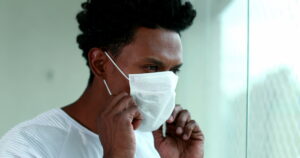Two people who were arrested in New Jersey for failing to wear a required mask at public meetings held during the Covid-19 pandemic claimed that their arrests violated their right to free speech under the First Amendment. In a decision issued on February 5, 2024, the Third Circuit Court of Appeals in Falcone v. Dickstein rejected their claims. holding that “[a]mid valid government-mandated health and safety measures, refusing to wear a face mask is not expressive conduct protected by the First Amendment.” Let’s explore how refusal to mask was viewed by the Court.
What is covered by the First Amendment?

In analyzing the claim before it, the Court recognized that the First Amendment protects not only “the spoken or written word…it also applies to some conduct in some settings, as circumstances matter.”
The Court noted that the Supreme Court has limited First Amendment protections to what it has called “inherently expressive” conduct. To qualify as inherently expressive, an action must satisfy two elements:
- the actor must “inten[d] to convey a particularized message,” and
- there must be a high “likelihood” that “the message [will] be understood by those who view it”
If some “explanatory speech is necessary,” the Court explained, the conduct does not warrant protection; otherwise, a party “could always transform conduct into ‘speech’ simply by talking about it.”
Thus, the Court examined the context of the conduct at issue to determine whether refusal to mask at a public meeting was sufficiently expressive such that the viewer would understand the message without further explanation. After analyzing a number of prior cases involving actions as speech, the Court concluded that it was “unlikely that a reasonable observer would understand her message simply from seeing her unmasked at the Board meeting.” On the contrary, there could be any number of reasons why someone may not be wearing a mask, such as a medical exemption. The Court contrasted the refusal to mask with other protected activity, such as flag burning. “Unlike burning a flag, wearing a medical mask—or refusing to do so—is not the type of thing someone typically does as ‘a form of symbolism.’”
Refusal to mask is not free speech
The Court went on to explain that “[s]keptics are free to—and did—voice their opposition [to mask mandates] through multiple means but disobeying a masking requirement is not one of them. One could not, for example, refuse to pay taxes to express the belief that ‘taxes are theft.’ Nor could one refuse to wear a motorcycle helmet as a symbolic protest against a state law requiring them.”
First Amendment protections for speech are generally broadly construed. However, limitations are also understood. Not crying “Fire!” in a crowded theater is one of the commonly recognized limitations on this freedom. When it comes to actions, as opposed to words, to come within the bounds of First Amendment protection, the conduct must be inherently expressive. Whether a specific action will qualify depends on context and whether the viewer would understand the message from the action alone. If not, the action will not be deemed to be Constitutionally protected and the actor is subject to any legal consequences that flow from the conduct.
Support in First Amendment case
Beyond refusal to mask, free speech is challenged often on local and national levels. On the 2024 docket, The First Amendment is the subject of many upcoming SCOTUS cases as well.
If you or your organization are facing a First Amendment violation, please reach out to our Litigation team for representation.









